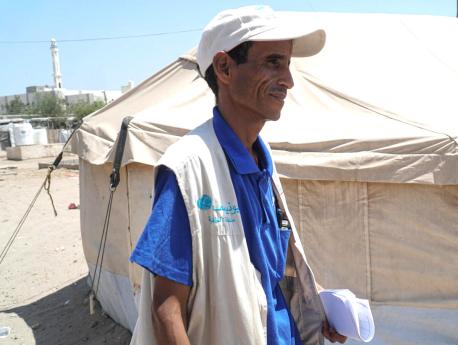
In a Yemeni IDP Camp, a Volunteer Dad Shares COVID Safety Guidance
Intense air bombing forced Yahya Ahmed Ganem Al Sofy, above, and his family out of their home in Hodeidah, Yemen and into Al Sha'ab IDP (short for internally displaced persons) camp in Aden.
Crowded conditions in IDP camps make it easy for infectious diseases to spread. To help educate the community on how to stay safe and prevent outbreaks, Al Sofy trained as a UNICEF volunteer outreach worker. He holds information sessions in the camp, sharing proper handwashing technique and the importance of avoiding close contact to stop transmission of the coronavirus.
“UNICEF provides us with health and water services," he said. "Before that, we were suffering from lack of latrines and water. They fixed everything related to water. The services provided by UNICEF are very good.”
Watch the video to learn more about how one dad is keeping his community safe from COVID-19:
Now in its seventh year, the conflict in Yemen has left 20.7 million people — 71 percent of the total population — in need of humanitarian assistance. An estimated 4 million people, including 2 million children, remain internally displaced. UNICEF works with partners to provide children and families with emergency services, including water, sanitation and hygiene (WASH), health care, nutrition support and more.
The benefits of hand hygiene in preventing the transmission of infectious diseases have been well-documented since 1850. But according to a new report from the World Health Organization and UNICEF, an estimated 2.3 billion people globally cannot wash their hands with soap and water at home and one third of the world's health facilities lack handwashing resources at the point of care.
Learn more about the State of the World's Hand Hygiene. Read the full report.
Ensuring that communities have solid information they can trust on how to stop the spread of COVID-19, along with access to handwashing and other hygiene facilities, is an integral part of UNICEF's work to end the pandemic. You can help.
Learn more about how UNICEF is helping children in Yemen.
Top photo: Forced out of his home by conflict in Yemen, Yahya Ahmed Ganem Al Sofy moved his family to Al Sha'ab IDP (short for internally displaced persons) camp in Aden, Yemen. He volunteered to work as a UNICEF-trained community outreach worker, teaching the importance of handwashing and physical distancing to prevent the spread of COVID-19 in the camp. © UNICEF/UN0538433/Noman. Video edited by Tong Su for UNICEF USA.
HOW TO HELP
There are many ways to make a difference
War, famine, poverty, natural disasters — threats to the world's children keep coming. But UNICEF won't stop working to keep children healthy and safe.
UNICEF works in over 190 countries and territories — more places than any other children's organization. UNICEF has the world's largest humanitarian warehouse and, when disaster strikes, can get supplies almost anywhere within 72 hours. Constantly innovating, always advocating for a better world for children, UNICEF works to ensure that every child can grow up healthy, educated, protected and respected.
Would you like to help give all children the opportunity to reach their full potential? There are many ways to get involved.





